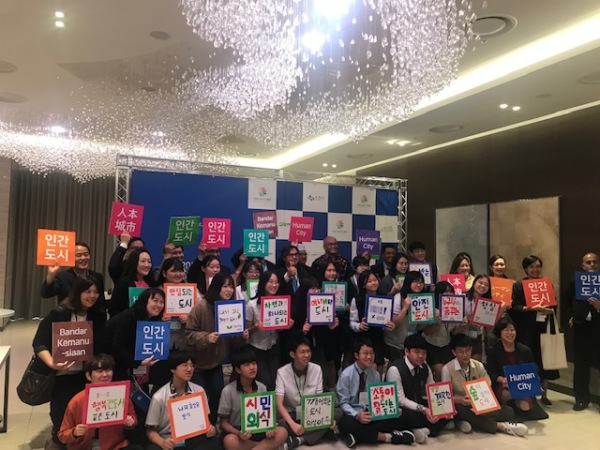For the past 3 years, CityNet and Suwon City have collaborated to organize the Suwon Forum which is an annual event centered on the creation of an “Asia Human City” and was made to facilitate the sharing of best practices and strategies needed to create a better living environment for the population. This year’s theme was titled “Human Cities for All” and featured topics such as Urban Regeneration, Housing Welfare, Urban Resilience, and Civic Democracy.
This year, on September 17th-18th, I had the opportunity to work as a staff member for the 2018 Suwon Forum. Before attending the event, I had little knowledge to what the concept of a Human City meant, but I discovered that there are varying meanings behind a seemingly simple term.
Within the overall theme, three sessions with sub-themes took place in order to provide insight into the various factors that are needed to create a Human City:
- A City Where Everyone is Happy
- A City Where People are Always Safe
- A City Where Anything is Possible
Speakers and participants weighed in on the numerous aspects behind a Human City and what contributes to its creation. A main element that was highlighted was the need for public participation. For instance, Oswar Mungkasa, the Deputy Governor of Jakarta, shared this when giving his idea of a Human City; a place in which the government and citizens work in collaboration and co-create the city, and one where the population can have a role in developing city policies and implementing them.

Another aspect that was frequently noted for a Human City was the importance of environmental sustainability through the incorporation of various ecological elements such as greater walkability, the creation of public spaces, and efficient and affordable public transportation through the use of BRT systems. For Taoyuan, Jiunn-Ming Chiou, the Deputy Secretary General of the city, expressed how one of the ways that they are working to achieve a human-oriented city is by improving the air quality and implementing more low carbon practices. One of their initiatives is the use of energy efficient infrastructure and housing, as 86 buildings of the city having attained GREE certification.
As the forum progressed, it became increasingly evident that a Human City was a multifaceted concept with many cities now developing an array of policies to implement in order to achieve this. However, the term itself started in Suwon.
A couple of years ago, the Mayor of Suwon, Tae Young Yeom, gave Suwon this concept of being a Human City. At this year’s Suwon Forum, he expressed the vision for the city; one that welcomes and values people, and is a place in which citizens have a role and opportunity to actively participate. During the forum, much was mentioned about the former king of Suwon who lead many initiatives for his citizens and constructed the Suwon fortress which is now a proud emblem for the history of the city.
On the second day, after the closing ceremony of the event, participants were taken on a site visit to the Hwaseong Fortress mentioned during the event, along with the Haenggung-dong Mural Village and the Hanok Technology Exhibition Hall in order for the forum’s participants to learn more about Suwon’s history and traditional heritage. With a walk through the city, one can see how deeply connected the city is to its culture and citizens. The well-maintained 222 year old fortress, the preservation of the traditional Hanok architectural style, and even small historical representations of past citizens painted along the pathways depict the value that Suwon has for its people, history, and culture.
During the site visits, I noticed that the collaboration from the people of Suwon can be seen throughout the city. In the Haenggung-dong Mural Village, the city is able to represent the people of the past through art representations made by the citizens of the present day. The art in the village also helps represents elements of a Human City as, during the tour, the guide noted how the artists and owners of the houses in the village collaborated on the design for the murals. One of them was even created by the community as the artist had laid out art supplies in front of the wall and allowed citizens to join in the process of creating the mural for the city.
The words “Human City Suwon—사람이 반갑습니다 (people welcome)” were even written in various places throughout the city.
Although having a Human City is a new concept, the practices shared by all in attendance at the Suwon Forum will help spread this idea across Asia, and I’m certain that the Suwon Forum will further this initiative for many years to come.
 Serena Spurgeon
Serena Spurgeon
Serena Spurgeon received a Bachelor’s degree in Foreign Languages and International Studies at the University of North Alabama, and is currently pursuing a Specialization Master’s degree in International Relations at the Univeristà Cattolica del Sacro Cuore in Milan, Italy. She was a co-author in political research conferenced at the Midwest Political Science Organization in 2018. Her areas of interest include environmental sustainability, SDGs, human development, and peace and conflict studies.














